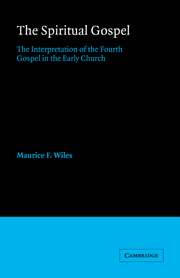Book contents
- Frontmatter
- Contents
- ACKNOWLEDGEMENTS
- ABBREVIATIONS
- INTRODUCTION Commentaries and commentators
- I The authorship and purpose of the Gospel
- II The Fourth Gospel and the Synoptic Gospels
- III Historicity and symbolism
- IV The signs
- V Leading ideas of the Gospel
- VI The Fourth Gospel and the Gnostics
- VII Christological interpretation in the third and fourth centuries
- VIII The Christological exegesis of Theodore and Cyril
- IX The Gospel of salvation
- EPILOGUE An assessment
- BIBLIOGRAPHY
- INDEX OF PROPER NAMES
- INDEX OF TEXTS
INTRODUCTION Commentaries and commentators
Published online by Cambridge University Press: 06 March 2010
- Frontmatter
- Contents
- ACKNOWLEDGEMENTS
- ABBREVIATIONS
- INTRODUCTION Commentaries and commentators
- I The authorship and purpose of the Gospel
- II The Fourth Gospel and the Synoptic Gospels
- III Historicity and symbolism
- IV The signs
- V Leading ideas of the Gospel
- VI The Fourth Gospel and the Gnostics
- VII Christological interpretation in the third and fourth centuries
- VIII The Christological exegesis of Theodore and Cyril
- IX The Gospel of salvation
- EPILOGUE An assessment
- BIBLIOGRAPHY
- INDEX OF PROPER NAMES
- INDEX OF TEXTS
Summary
Theological scholarship in recent years has shown an especial interest in the interpretation of the Fourth Gospel and in patristic exegesis of the Bible. Within the brief period between 1953 and 1956, three major works on the Fourth Gospel have been published in England. On the continent the work of Père Daniélou and others has shown a revival of interest in early Christian exegesis. This study is devoted to the exegesis of the Fourth Gospel in the early Greek fathers in the hope that it will be of value in both fields of study.
The Fathers knew well the fascination of the Fourth Gospel. Origen describes the Gospels ;as the first-fruits of all Scripture, and the Gospel of St John as the first-fruits of all the Gospels, and we have in fact more than one work of major importance in commentary upon it. There are some books of the Bible whose interpretation has been so completely revolutionised by modern critical methods that the exegesis of earlier centuries is unlikely to add much of value to our understanding of them. There is probably no book of which this is less true than the Fourth Gospel.
It is of such a nature that it seems to reveal its secrets not so much to the skilful probings of the analyst as to a certain intuitive sympathy of understanding. We need not, therefore, despair of finding amongst such early interpreters significant examples of a true insight into the meaning of the Gospel. It is also a particularly valuable field within which to study the pattern of early exegesis.
- Type
- Chapter
- Information
- The Spiritual GospelThe Interpretation of the Fourth Gospel in the Early Church, pp. 1 - 6Publisher: Cambridge University PressPrint publication year: 1960



